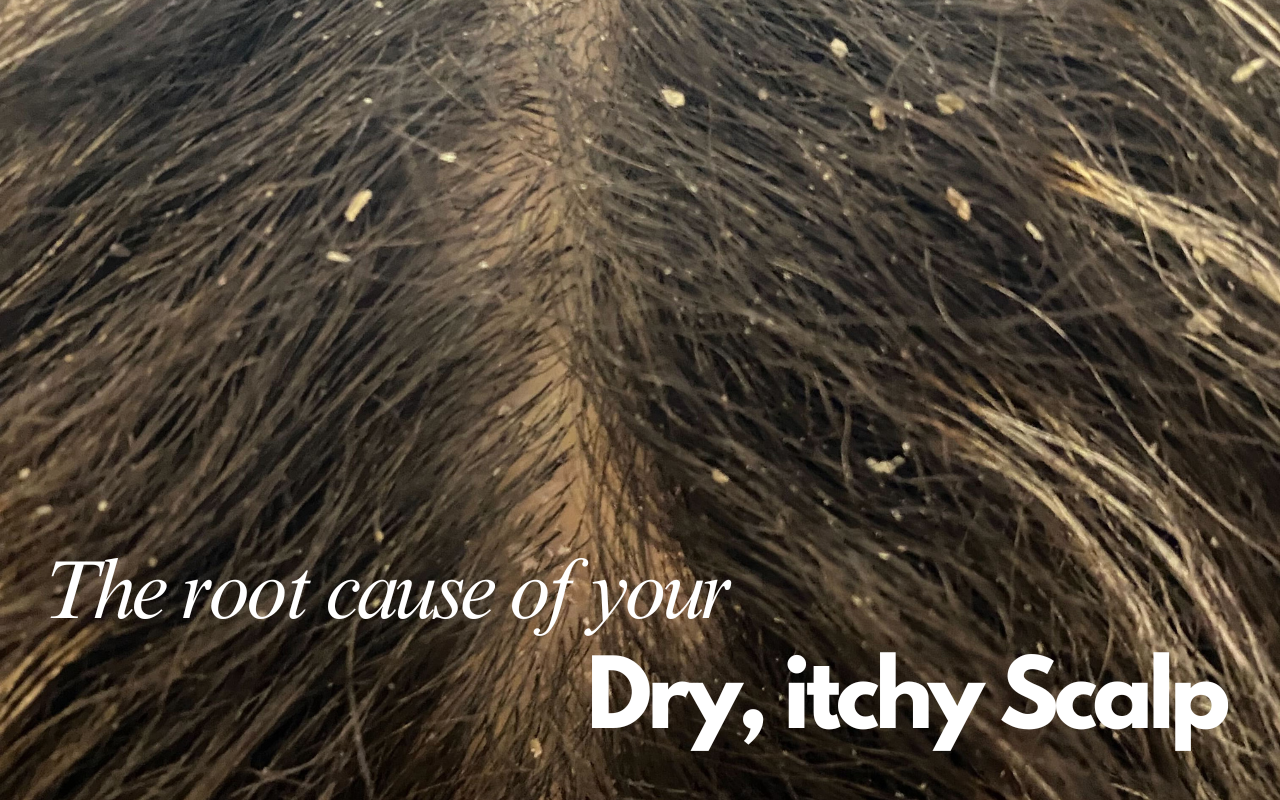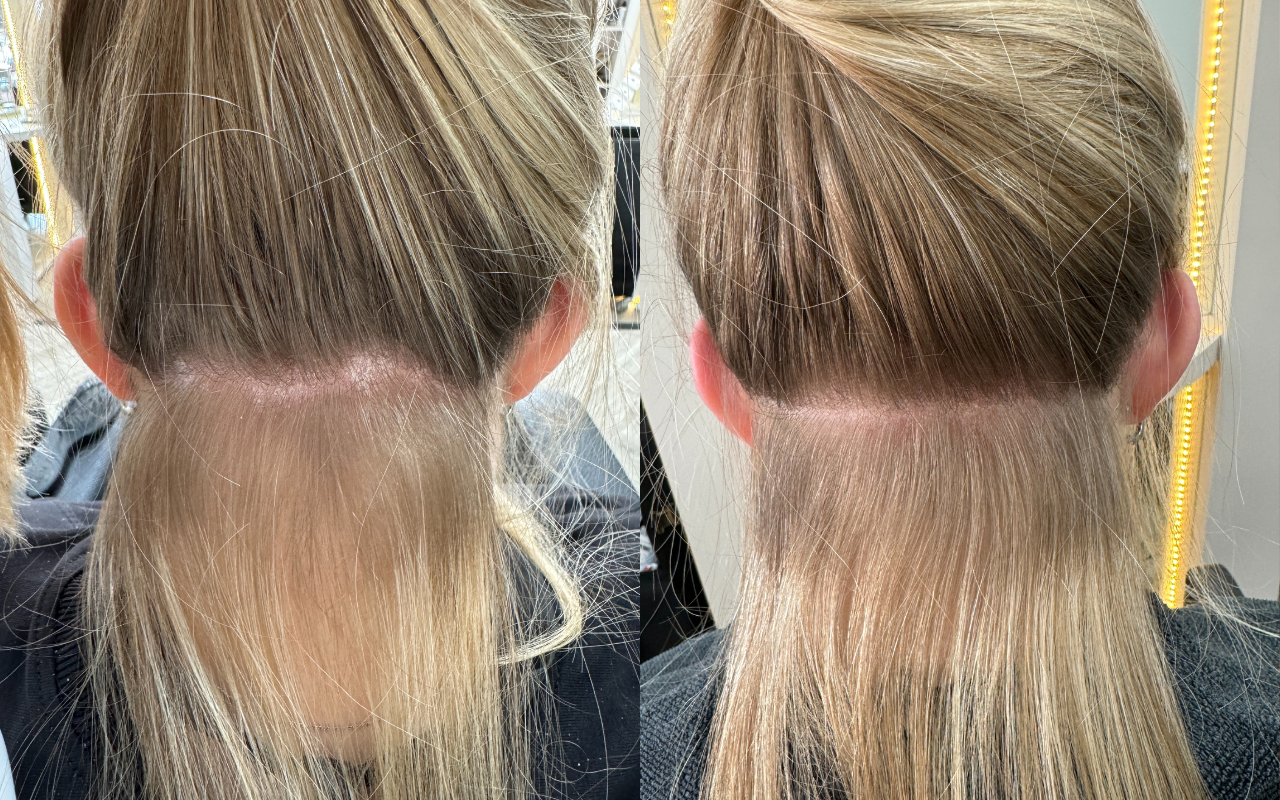Why Is My Scalp Dry? Understanding the root causes and best treatments.
Having a dry scalp can be frustrating, uncomfortable and embarrassing. An Itchy, flaky, and irritated scalp can also lead to a host of hair and scalp related issues, from dandruff to hair breakage and even hair loss. Understanding the root causes of dry scalp and adopting effective remedies can help to restore balance and harmony to your scalp whilst promoting healthy, hydrated hair. In this article, we'll explore the common reasons dry scalp can develop and what you can do to restore health and hydration whilst also protecting your scalp from further damage.
Why is my scalp dry and itchy?
The scalp is possibly one of the most underserved areas in most people's beauty routines. Let’s have a show of hands of how many people really have only ever used shampoo on their scalp? We’re guessing you may have had your hand raised there, even if only mentally, and that’s okay because we’re here to offer you a way of changing that and the rewards will be a happier, more hydrated scalp which in turn will contribute to stronger, healthier hair.
Over-washing and Harsh Shampoos
The trouble with the fact that most people are only using shampoo on their scalp is that shampoo, at the end of the day, is a detergent. Unlike our shampoos, which are very gentle, many on the market are full of harsh chemicals such as Sulphates that dehydrate the scalp and hair, stripping away natural oils completely.
The analogy we like to make is ‘you wouldn't use a facial cleanser without applying moisture back into your skin afterwards’. Yet it has been the ‘normal’ way for such a long time to use a harsh shampoo full of cheap ingredients that is ultimately not doing your scalp, or hair, any good.
Washing your hair too frequently especially when using shampoos with harsh chemicals can also strip the scalp of its natural oils, leading to dryness and irritation. Always opt for sulphate-free shampoos like the CENTRED daily Calma Soothe & Repair Shampoo, enriched with natural ingredients like aloe vera and chamomile, to cleanse your scalp gently without causing dryness.
What else causes dry scalp?
Environmental Factors:
Environmental elements such as cold weather, low humidity, and excessive sun exposure can contribute to dry scalp. Shield your scalp (and hair) from harsh weather conditions by wearing a hat or using a protective hair shield like the CENTRED Unwind Detangling Primer, enriched with Vitamin A and E, which forms a protective barrier against external stressors.
Scalp Skin Conditions:
Certain scalp conditions like seborrheic dermatitis and psoriasis can cause dryness, flakiness, and itching. If you suspect a scalp condition, seek advice from a dermatologist for a proper diagnosis and personalised treatment plan. Taking proper care of your scalp can also involve your diet as certain foods may be inflammatory which can trigger or make worse certain skin conditions.
Scalp Dehydration:
Just like the rest of our body, our scalp needs hydration too. Harsh shampoos along with the use of dry shampoos can really dry the scalp out. Drinking an adequate amount of water daily can help maintain scalp health and prevent dryness. Additionally, massage your scalp with CENTRED En-Root Scalp Oil, a blend of argan oil, coconut oil and rosemary leaf extract to add moisture, reduce inflammation and improve scalp circulation.
Product Buildup:
Using excessive hair styling products can lead to product buildup on the scalp, obstructing the pores and causing dryness. Regularly clarify your scalp with using En-Root Scalp Oil containing Salicylic Acid and Tea Tree Oil along with squishy scalp massager that will help to exfoliate the scalp, removing any impurities such as build-up, dead skin cells, dirt and sebum.
Hot Water Showers:
Hot water showers may feel relaxing, but they can strip the scalp of its natural oils, leading to dryness. Opt for lukewarm water when washing your hair and finish with a cool water rinse to help seal the hair cuticles and retain moisture.
What is a scalp condition?
A scalp condition refers to any abnormality, irritation, or disorder that affects the skin on the scalp. These conditions can vary in severity and may present with a wide range of symptoms, including itching, redness, flakiness, inflammation, pain, or changes in hair growth patterns. Scalp conditions can be temporary or chronic and may be caused by various factors, such as genetics, environmental triggers, lifestyle choices, and underlying health issues.
What’s the difference between dry scalp and dandruff?
You may not be aware because most people don't realise it but dry scalp and dandruff are two very different scalp conditions. Although they can both cause discomfort and irritation, they have distinct characteristics and underlying causes. Understanding the differences between the two is crucial to choose the right treatment approach.
Many people who say they have dandruff, really just have a dry scalp and the trouble with that is they reach for
anti-dandruff shampoos which can be super drying which in turn leads to more dryness and flakes.
Dry Scalp:
Cause: Dry scalp occurs when the skin on the scalp lacks sufficient moisture and natural oils, leading to dryness and flakiness. It may be caused by environmental factors, such as cold weather or low humidity, over-washing the hair, using harsh hair care products, or not moisturising the scalp adequately.
Symptoms: The primary symptoms of dry scalp include itching, flakiness, and a feeling of tightness or dryness on the scalp. The flakes are usually small and white or greyish.
Scalp Appearance: The scalp may appear dry and may not be red or inflamed.
Scalp Oil: Dry scalp can be associated with a lack of natural oil (sebum) production, leading to a feeling of dryness.
Dandruff:
Cause: Dandruff is a common scalp condition caused by an overgrowth of a yeast-like fungus called Malassezia. This overgrowth can be triggered by factors like excessive oil production, hormonal imbalances, stress, and an impaired immune response.
Symptoms: The main symptom of dandruff is the presence of larger, oily or greasy flakes on the scalp. It is often accompanied by itching and irritation.
Scalp Appearance: The scalp may appear red, inflamed, or irritated in areas affected by dandruff.
Scalp Oil: Dandruff can be associated with excessive oil (sebum) production, leading to oily flakes.
Treatment Differences:
For dry scalp, the focus should be providing moisture on the scalp and preventing further dehydration.
Use Daily Calma Shampoo as your cleanser and apply En-Root Scalp Oil once a week for a minimum of 20 minutes to deeply hydrate and nourish your scalp, helping to rebalance moisture levels and prevent future dehydration.
For dandruff, scalp detoxification is needed. Using En-Root Scalp Oil twice weekly with Squishy Scalp Massager will help to tackle the fungal imbalance whilst restoring a fresh base for healthy hair. With Salicylic Acid and Tea Tree Oil, En-Root Scalp oil is an ideal treatment for dandruff whilst Rosemary oil for hair, Castor oil and Lavender Oil help to reduce inflammation, soothe and calm.
What is the best oil for a dry scalp?
Coconut Oil:
Coconut oil is a popular choice for moisturising the scalp and hair due to its excellent emollient properties. It contains medium-chain fatty acids, such as lauric acid, which easily penetrate the hair shaft and scalp, providing deep hydration and nourishment. Coconut oil forms a protective barrier on the scalp, helping to lock in moisture and prevent water loss. Its antimicrobial properties may also help combat scalp issues like dandruff and fungal infections.
Jojoba Oil:
Jojoba oil is unique in that it closely resembles the skin's natural sebum. This similarity allows it to balance the scalp's oil production, making it suitable for both dry and oily scalps. Jojoba oil is a lightweight oil that easily absorbs into the scalp without leaving a greasy residue. It is rich in vitamins E and B, as well as antioxidants, which nourish and protect the scalp and hair follicles. Jojoba oil's soothing properties can help alleviate scalp dryness, itching, and irritation, making it an excellent choice for sensitive scalps.





